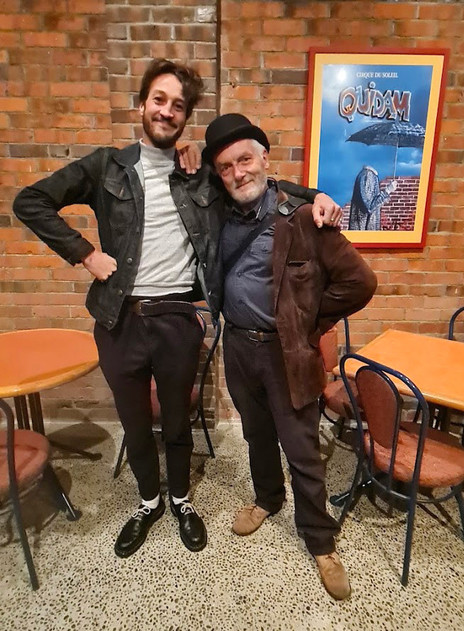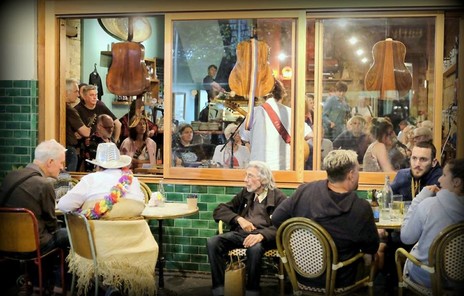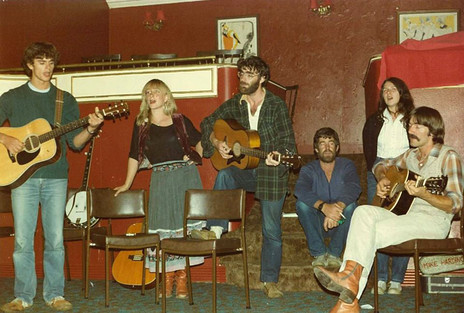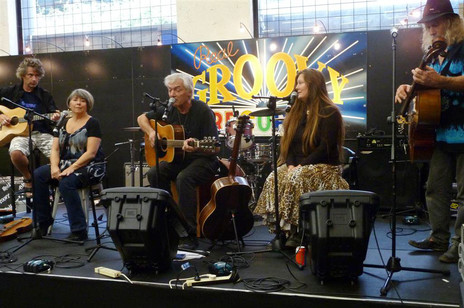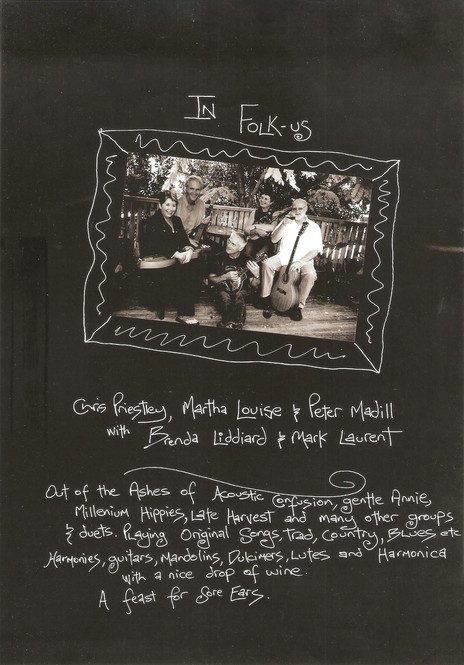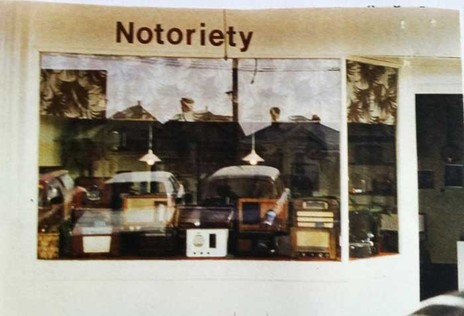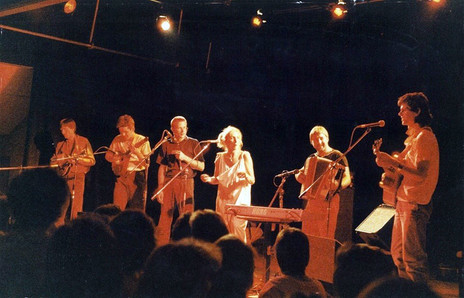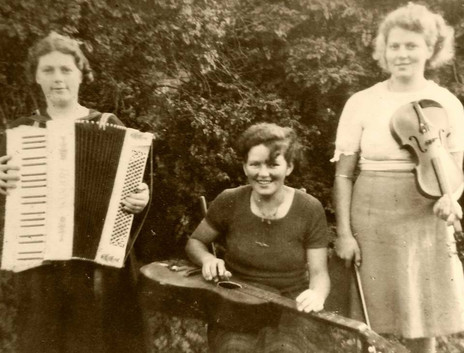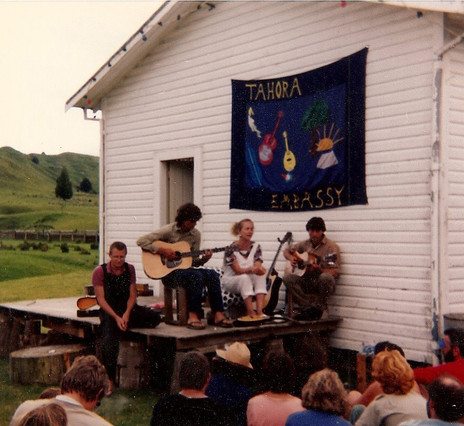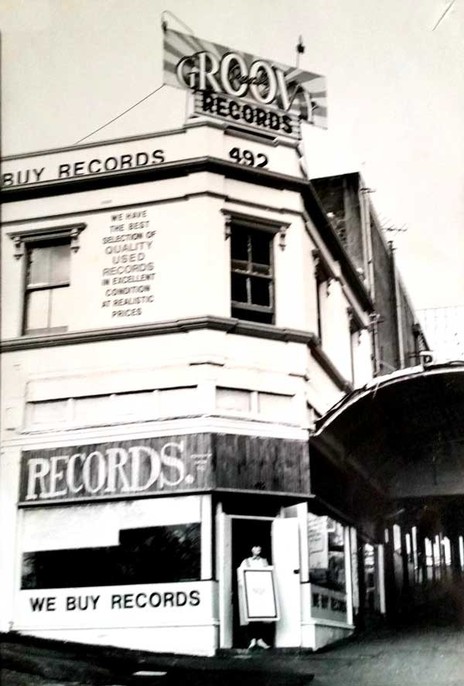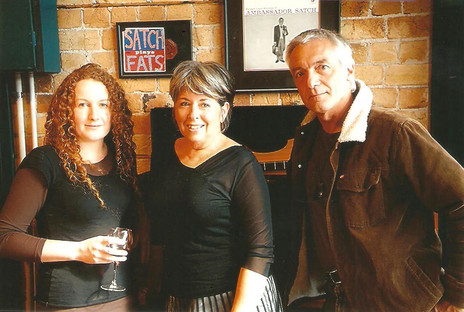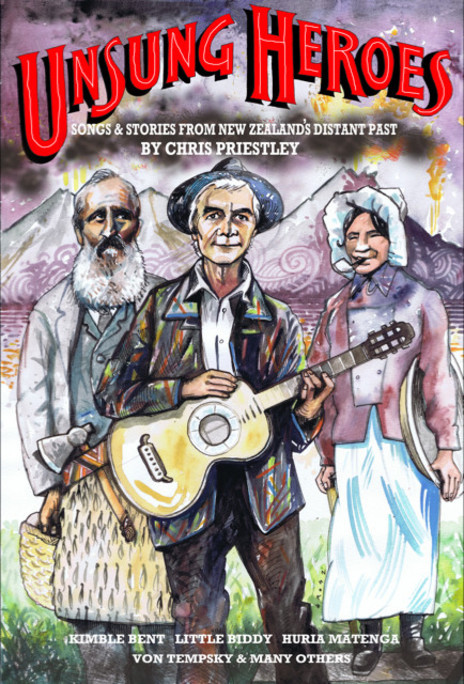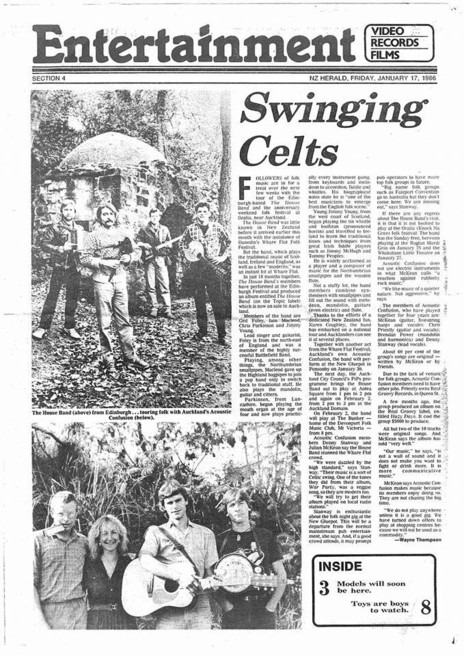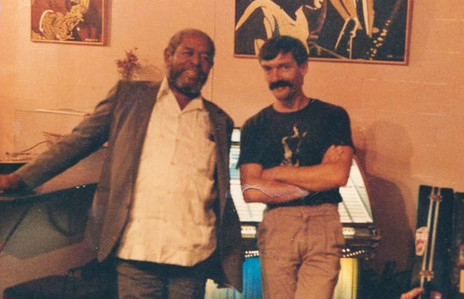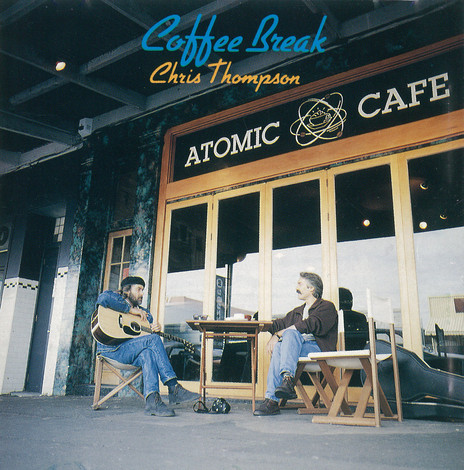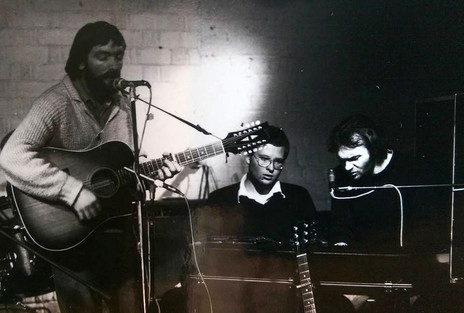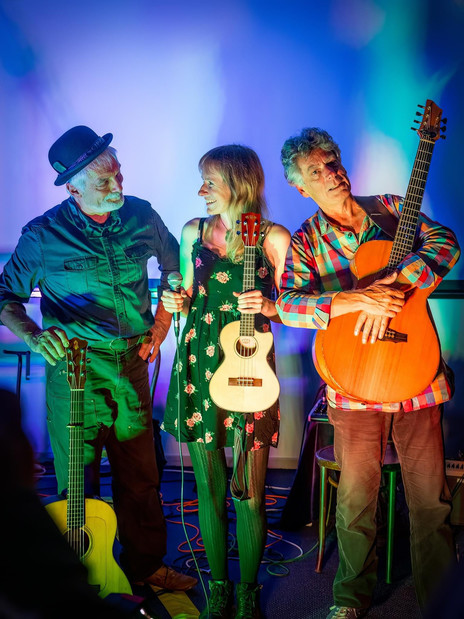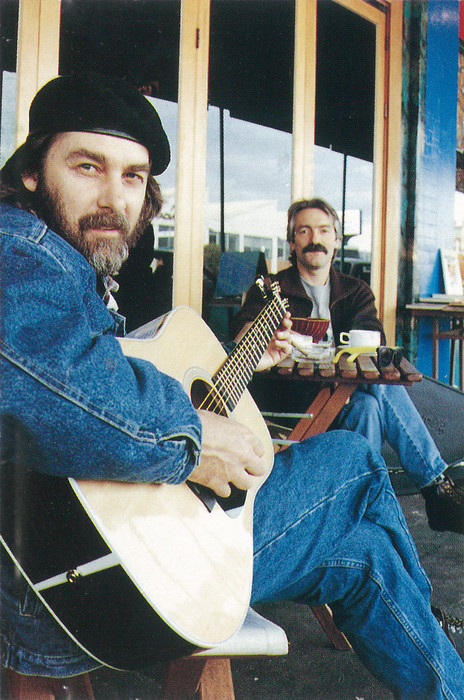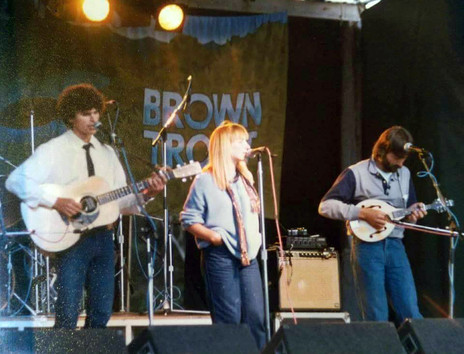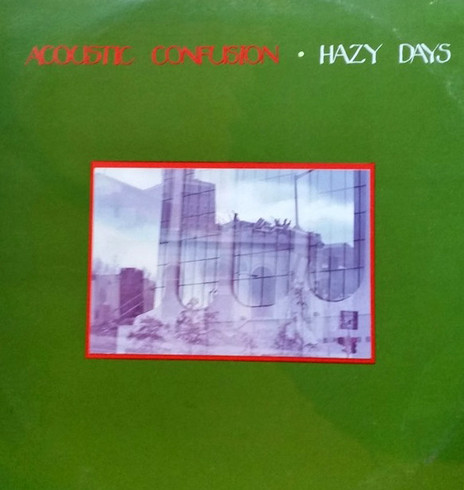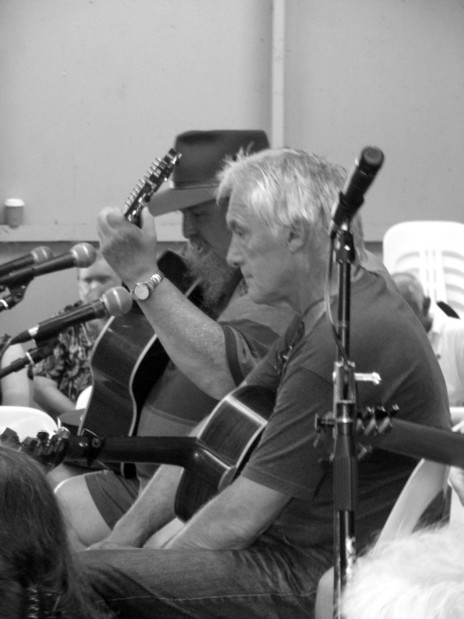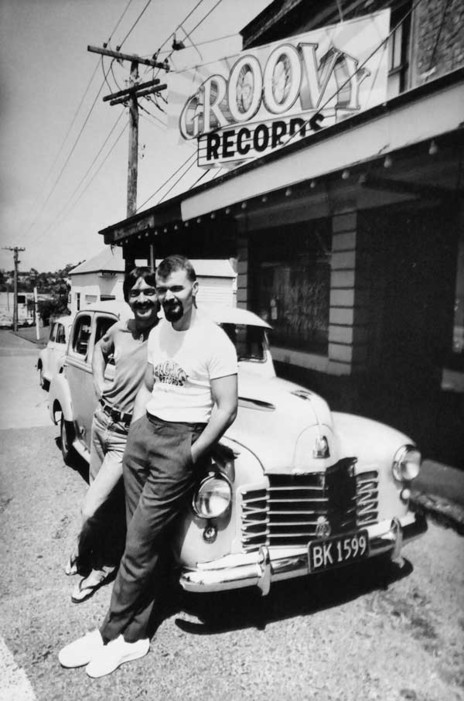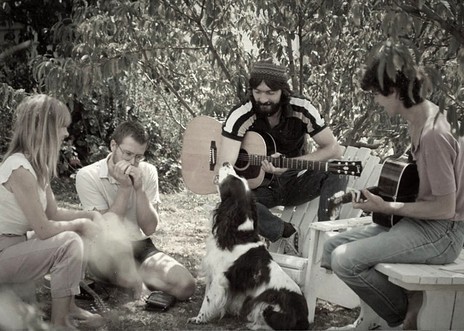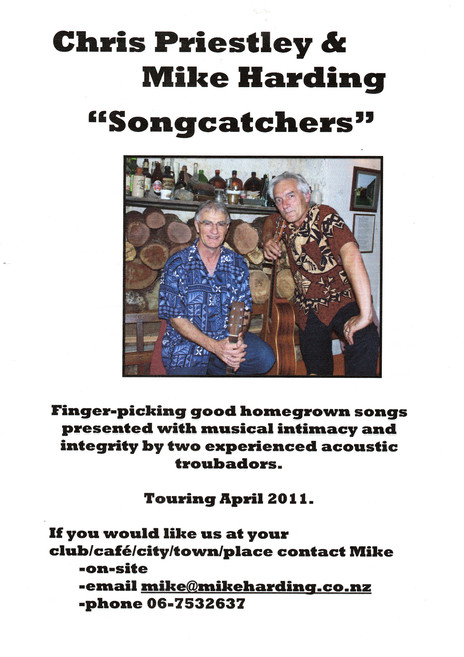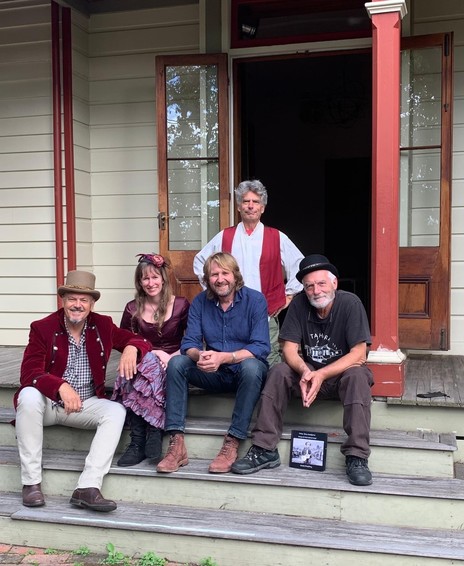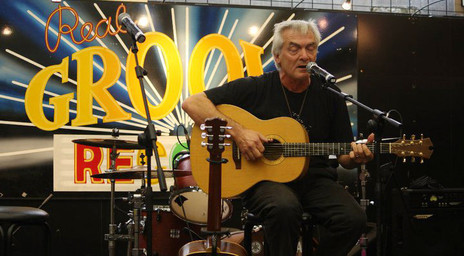Acoustic Confusion’s album from 1984 and Priestley’s own Argentina To Invercargill from 10 years later were brimming with offerings from this clique and newer additions such as John Beavis, David Hollis and Phil Powers.
But Priestley wasn’t writing any of his own songs back then, he was too busy organising concerts, and co-founding and running businesses such as record store Real Groovy, Java Jive Café, Atomic Café and its successor Café One2One. It was well after 2000 that he noticed a dearth of folk songs – in a modern style about New Zealand and New Zealanders – and decided to put pen to paper himself.
After 2000 Priestley decided to write folk songs, in a modern style, about New Zealand
“If you listen to those first albums there’s not a single song that even remotely mentions a New Zealand place name,” Priestley said. “We were contemporary, so we just sang love songs and stuff. Till I had this great inspiration and thought, wait a minute, there aren’t many great songs about New Zealand history.
“Phil Garland was around, but they were really of a certain era, and they weren’t my style, I didn’t think. Paul Metser was probably the exception, but most of his were love songs except ‘Farewell To The Gold’, which is still one of the great songs. It opened my eyes to the fact that there were a lot of interesting New Zealand characters out there yet unsung. So that’s when I thought maybe I’ll start writing a few of them.”
He organised a co-writing session with songwriting guru Arthur Baysting, who gave him impetus and confidence in his ability. The two songs the pair wrote – ‘Huria Matenga’ and ‘Darling Jennie’ – would find a home on Priestley’s 2013 album Unsung Heroes.
By the time of the 2016 Auckland Folk Festival, Priestley was presenting a workshop on writing songs about New Zealand history. He asked godfather of New Zealand folk Phil Garland to participate, and the two compared their approaches to gathering information.
“He’d tell his story about how he went into a pub in Greymouth and he spoke to this old guy, ‘And he told me about that …’ And then I’d say, ‘I went online, and I found …’ They were the two different ways of finding information for a song; his being far more glorious.” After Garland passed away in March 2017, Priestley became minder of his vast New Zealand book collection.
Christopher Priestley was born in Auckland in 1956. His father was a postmaster, so the family moved around a lot, spending a few years in Nūhaka, Tokomaru Bay – “Where I was probably the only Pākehā at the school” – and Tūrangi. After Priestley had started at Tongariro High School his father was transferred to Browns Bay in Auckland.
At the time The Beatles came to New Zealand in June 1964, Priestley’s uncle was working at the Auckland Town Hall and got all four Beatles to sign a tour programme “To Christopher”. It was his prized possession until moving out of home some 10 years later – and he has never been able to find it again.
“When I was eight years old, The Beatles were everything”
“When I was eight years old, The Beatles were everything,” Priestley says. On regular visits from Tokomaru Bay to Auckland, his grandmother would take him to the movies. It was how he first saw The Beatles in Help! On subsequent trips north he would ask his nanna: “Can you take me to see Help! again?” A year or so later he was given the Help! LP, which he still owns, although it’s now unplayable and most of the cover has been eaten by ants. “That was my first love of music, that Help! record. I played it over and over again.”
It was the first acquisition in what would become an obsession in collecting records. As his ears were opened to the likes of The Rolling Stones, The Who and Led Zeppelin, it was the acoustic-based songs that drew him in.
In the mid-1970s, he began attending The Poles Apart folk club in Newmarket where he received guitar lessons from Bill Worsfold and caught the eye of proprietor Frank Winter. “He was really encouraging, just the loveliest man, and I was very quiet,” Priestley said. “He could see something in me that was quite good, but he couldn’t hear it. He really was so encouraging, so I just wanted to go back every week and play a little bit more.”
Priestley and his first wife spent around a year in the South Island where they picked fruit in Motueka. Most of their fellow pickers were folk singers who would meet at a church-run café to jam. Although he was “too scared” to play with them, Priestley would invite them back to his caravan to listen to Snooks Eaglin, John Renbourn’s Another Monday, or Help! on his battery-powered record player.
Back in Auckland, the couple would take in the international touring acts passing through such as Tom Waits, Leo Kottke and Leon Redbone, and Priestley became friends with Record Exchange co-owner Chris Hart and began working in the St Kevin’s Arcade shop on Thursday nights “to pay for my Coltrane habit”. In 1980, Hart’s business partner bought him out and he and Priestley established the Notoriety record shop next to Harvest Wholefoods in Grey Lynn.
The following year, Priestley was invited to appear on the annual University Folk Club concert at the Maidment Theatre and roped in Poles Apart regulars Julian McKean and Denny Stanway to sing harmony. When harmonica virtuoso Brendan Power arrived from Wellington shortly afterwards, Acoustic Confusion was born.
“Then Julian started writing great songs as well,” Priestley said. “We started learning songs of other New Zealand, mainly Auckland, folkies and performing them as part of our concert. When we went to Whare Flat [an annual folk festival north-west of Dunedin], we were sort of like a sensation because we had this whole repertoire of songs and then there was Brendan Power, the most incredible harmonica player already.”
Modern original songs were not common in local folk music and the Auckland scene was bristling with a new breed of songwriters whose material was being taken to heart by the entire cohort. “The songwriting at that time was so phenomenal that they really inspired each other to do it. I kind of missed out because I was too busy and had kids and was usually the person who organised the gatherings.”
After Notoriety closed its doors, Priestley and Chris Hart established record store Real Groovy at the top of Mt Eden Road before moving the store to Queen Street. Priestley hosted the Real Groovy Records Show on Radio B (the precursor to 95bFM), which would evolve into the Border Radio show.
Acoustic Confusion released its 1984 album ‘Hazy Days’ on Real Groovy Records – RGR001
He also set up the Real Groovy Records record label that enabled Acoustic Confusion to release their 1984 album Hazy Days – RGR001. Recorded mostly at Harlequin Studios, Hazy Days featured five of McKean’s songs as well as songs by Aucklanders Sieffe La Trobe and Phil Powers and covers of Chuck Berry and Skip James.
The label’s second release was the compilation LP Auckland Acoustics in 1985, for which Priestley brought together the cream of the city’s flourishing folkie set in Mahinaarangi Tocker, Chris Thompson and his wife Lynne, Kath Tait, Wayne Gillespie, Nick Smith, the all-female vocal trio Siren, and his own Acoustic Confusion.
Priestley and Hart were heading in different directions by the end of 1985 and tossed a coin to see who would buy who out of Real Groovy. Priestley departed and opened music-themed restaurant Java Jive Café in the Hydra Bacon building in College Hill. When that building was slated for demolition, the Java Jive moved to Pompallier Terrace in Ponsonby.
Acoustic Confusion imploded around 1986 and Priestley undertook gigs under his own name, surrounding himself with a collection of musical friends that included any combination of “a great wash of amazing harmony singers” such as Martha Louise, Cath Woodman and Angela Fox.
In late 1989, Priestley sold the Java Jive to Gluepot bookings manager and promoter Paul Walker and his then wife, blues and jazz singer Beaver. Priestley’s next endeavour was Kerouac’s coffee bar in Vulcan Lane, but he soon outgrew the premises and opened Atomic Café in Ponsonby Road.
“[Kerouac’s] got too busy and it was too small, so I thought, ‘I’d really like to go back to Ponsonby,’ because I love that area,” he said. “We got a second-hand roaster from the US and stuck it in there. We were the hip place.” It also became a hangout for musicians who would sit and play amongst the customers.
Produced by Priestley and multi-instrumentalist Robbie Lavën of Red Hot Peppers fame, Priestley’s debut solo album Argentina To Invercargill was released on cassette in 1994. Beginning with Chris Wolferstan’s ‘Plains Of Argentina’ and originally ending with Wayne Gillespie’s ‘Invercargill’, it was later released on CD as Argentina To Invercargill and Beyond with two Acoustic Confusion tracks from 1984 added.
As if running the Atomic Café and playing music wasn’t enough, Chris Priestley was three-time New Zealand pétanque champion and competed in world championships in Las Palmas in Spain, Monaco and Brussels. Playing tournaments in the rugby-mad South of France meant a haka was almost mandatory.
The hours of practice required for the sport saw Priestley give the game away to focus again on music, and in 2005 came Uncovered: A Collection Of New Zealand Folk Songs. Brendan Power contributed harmonica from his London base while most of the instrumentation, including drummer Steve Cournane and bassist George Barris, was recorded by Robbie Duncan at Braeburn Recording Studio in Wellington.
In 2009, Priestley released the children’s album Emilie Bliss and Charlie Bean, which included the first two songs he’d written, and decided to try and write around New Zealand history, making the pivotal visit to Arthur Baysting. When Priestley and his wife, former Limbs dancer Felicity Molloy, sold up in Auckland and moved to Dunedin later in the year to be closer to her family, he finally found time to concentrate on his writing.
However, they returned to Auckland a year later and Priestley became a partner in buying back the Atomic Café, which he had renamed Café One2One when he sold the roasting side of the business before heading south. The café went from strength to strength with music four nights a week – folk on Thursday, jazz on Friday, guitarist Mark Laurent and a guest on Saturday, open mic on Sunday, and occasional overseas acts. The venue was sold as a result of the Covid pandemic.
His following two albums – Unsung Heroes: Songs & Stories From New Zealand’s Distant Past and Rogue – were bursting with his songs based on characters from the country’s colourful history, including ‘Von Tempsky’, ‘Three Telegrams’, which chronicled wartime correspondence from the Prime Minister’s office to Priestley’s grandmother, and ‘Richard Pearse’, the story of a South Canterbury farmer who may or may not have beaten the Wright brothers to powered flight. Another album, God’s Own Country, was hindered by coronavirus but is mostly available on YouTube.
Priestley and a troupe of players have taken the ‘Unsung Heroes’ concept on the road
In recent years, Priestley has taken the Unsung Heroes concept on the road with a troupe of the same name that also includes TV producer and presenter Cameron Bennett, Nigel Gavin, Sonia Wilson and actor Peter Elliott. The band perform in front of a slideshow and songs are interspersed with a top-hatted Elliott reciting newspaper clippings of the time in various colonial accents.
“This is a new way of presenting our folk music and it’s appealing to a much wider public,” Priestley said. “We’ve been getting lots of non-folk people that would never normally go to a folk club. And we just collect more songs wherever we go because people come out of the audience, ‘Have you ever heard of …’”
After a show organised by old friend Lorina Harding in Geraldine, where they were joined by Marlon Williams for the encore, the group was invited for morning tea the next day by the family of early aviator Richard Pearse and got to see where he grew up.
Besides organising more touring and uncovering more unsung heroes, Chris Priestley is on the board of trustees of the Aotearoa NZ Folk Alliance, whose website says it “seeks to bring the existing, enduring network of folk music activity in New Zealand front and centre – locally, nationally and internationally.”
